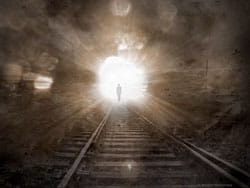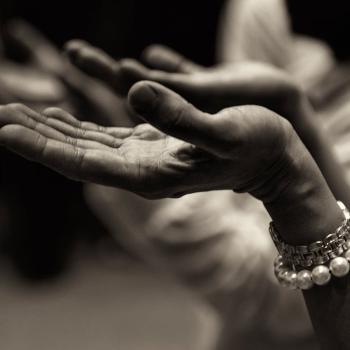By Bridget Jack Meyers
 Christian bookstores sometimes sell personalized bookmarks listing your name, its meaning, and a Scripture verse that goes along with it. Youth leaders gave these to me often while I was growing up, and they would say something like this:
Christian bookstores sometimes sell personalized bookmarks listing your name, its meaning, and a Scripture verse that goes along with it. Youth leaders gave these to me often while I was growing up, and they would say something like this:
BRIDGET / Irish: ‘Strength' / ‘The Lord is my strength and my song.' ~ Psalm 118:4
I grew up thinking my given name meant "strength," which I guess is okay as names go. It wasn't until I was a pregnant adult in my mid-twenties beginning to research names for my future daughter that I learned the other meanings of my name: "exalted one" or "high goddess." "Strength" isn't incorrect, but it is one of the least potent interpretations of the name. Why do the makers of cute personalized Christian bookmarks shy away from describing us Bridgets in more divine terms?
Deification Phobia
I think it has to do with Western Christianity's phobia of deification, sometimes known as theosis or divinization. Deification is the doctrine of humans becoming gods or, as the Eastern Orthodox church beautifully puts it, "becoming by grace what God is by nature." I think it's safe to say that evangelicals don't actively believe in deification. I've been a practicing evangelical for the last twelve years and a less active evangelical for six years before that, in which time I've been to all kinds of evangelical conferences, retreats, Bible studies, youth camps, and festivals, and I have never once heard deification preached from the pulpit, taught as a lesson, or discussed with a small group. None of the evangelical devotional books I've read have discussed it, either.
Not only do evangelicals not preach deification, but when we hear that Mormons believe in a version of it (usually referred to as "exaltation"), we become outright opposed to it. We start arguing that wanting to become a god is sinful, that the notion of becoming "like God" was part of Satan's temptation of Eve in the garden of Eden (Gen. 3:5). We don't bother to stop and examine the Bible for ourselves to see whether or not there could be any biblical basis for the doctrine, nor are we aware of the strong history of deification among Christian writers whom we consider orthodox. As Greg Johnson said in Bridging the Divide, "We react to each other's theological emphases... and we almost conclude that if, doctrinally speaking, the Mormons are headed east then we had better head west" (p. 29-30). Deification has Mormon cooties on it now, so we don't want it.
Biblical and Historical Basis for Deification
In my opinion this is unfortunate because, not only is the doctrine of deification beautiful, it is clearly biblical, was taught by many historic Christian thinkers, and harmonizes well with the traditional Protestant doctrines of sanctification and glorification. Latter-day Saints are fond of quoting Psalm 82:6 in support of exaltation ("I say, 'You are gods, children of the Most High, all of you'") which was echoed by Christ in John 10:34, but I actually think this is one of the weaker passages since it is clearly idiomatic. Neither the traditional doctrine of deification nor the LDS doctrine of exaltation teaches that we are gods now.
Here are some of the passages that I think provide better support (NRSV, emphases mine):
His divine power has given us everything needed for life and godliness, through the knowledge of him who called us by his own glory and goodness. Thus he has given us, through these things, his precious and very great promises, so that through them you may escape from the corruption that is in the world because of lust, and may become participants of the divine nature (2 Peter 1:3-4).
But our citizenship is in heaven, and it is from there that we are expecting a Savior, the Lord Jesus Christ. He will transform the body of our humiliation that it may be conformed to the body of his glory, by the power that also enables him to make all things subject to himself (Philippians 3:20-21).



